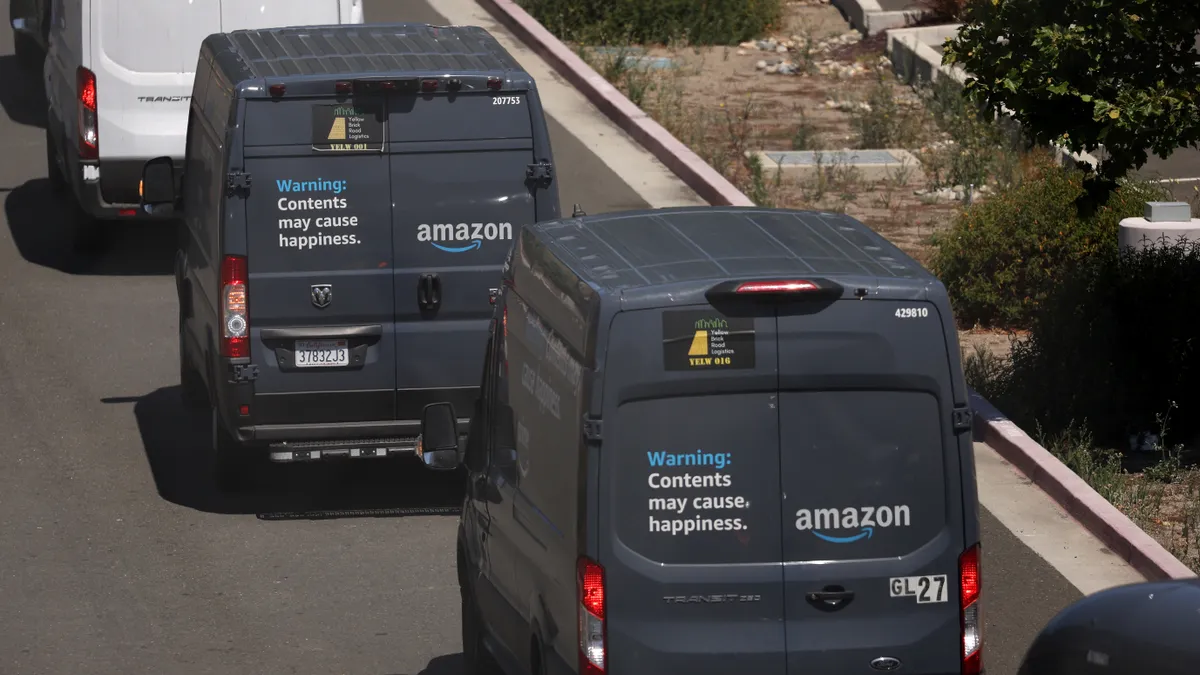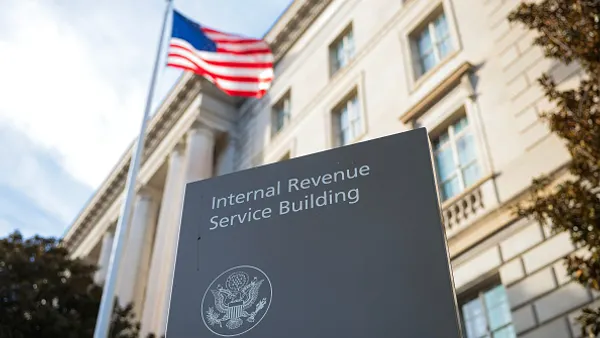Dive Brief:
- Amazon is closely monitoring the macroeconomic environment, including the impact of tariffs, CFO Brian Olsavsky said in a May 1 earnings call.
- The company’s net sales increased 9% to $155.7 billion in the first quarter, compared with $143.3 billion in the year-earlier period. But Olsavsky indicated that macroeconomic uncertainty created by Trump administration tariff policies is clouding the second-quarter outlook.
- “We're planning for various outcomes, and we've taken a number of actions to protect the customer experience,” the finance chief said during the call. “We're doing everything we can to keep our prices low for customers in a way that makes economic sense.” The online retail giant faced the ire of President Donald Trump in late April after it considered displaying the added cost of tariffs on certain items, according to CNN and other news outlets.
Dive Insight:
Amazon is among several big tech companies that have reported earnings in recent weeks.
While the sector has produced strong growth numbers overall during its latest earnings season, there has been a “considerable variance” among the players,” according to a report by Zacks Investment Research. Year-over-year, Amazon’s earnings growth rate in the last quarter was +42.6%, compared with +46% at Alphabet, 4.8% at Apple, and -56.8% at Tesla, the report said.
For its part, Amazon hasn’t “seen any attenuation of demand yet” as a result of tariff announcements by the Trump administration, CEO Andy Jassy said during Thursday’s earnings call.
“To some extent, we've seen some heightened buying in certain categories that may indicate stocking up in advance of any potential tariff impact,” Jassy said. “We also have not seen the average selling price of retail items appreciably go up yet. Some of this reflects some forward buying we did in our first-party selling and some of that reflects some advanced inbounding our third-party sellers have done, but a fair amount of this is that most sellers just haven't changed pricing yet. Again, this could change depending on where tariffs settle.”
Amazon isn’t the only tech company that has flagged risks posed by Trump’s tariffs in recent weeks and months.
Apple has so far seen a “limited impact” from tariffs as the tech company has focused on optimizing its supply chain and inventory, CEO Tim Cook said during a Thursday earnings call. But the company estimates a tariff impact of $900 million in the next quarter, assuming the current global tariff rates, policies and applications do not change for the balance of the quarter and no new tariffs are added.
“For our part, we will manage the company the way we always have, with thoughtful and deliberate decisions, with a focus on investing for the long term, and with dedication to innovation and the possibilities it creates,” Cook said.
Meanwhile, Tesla has seen near-term challenges in its business as a result of both tariffs and brand image, CFO Vaibhav Taneja said during the electric vehicle maker’s April 22 earnings call.
Tesla CEO and Trump ally Elon Musk weighed in on the issue as well: “I’m an advocate of predictable tariff structures and generally, I’m an advocate for free trade and lower tariffs,” he said during the call, adding that Trump is “the elected representative of the people and is fully within his rights to do what he would like to do.”
Besides the impact of tariffs, the company has also grappled with growing backlash related to Musk’s role as a central figure behind the Department of Government Efficiency.
Big tech stocks were hammered early this year after the sudden rise of Chinese tech startup DeepSeek, which attracted global attention after releasing an open-source AI model that it claimed was built at a low cost compared with U.S. rivals like ChatGPT. The startup’s rise prompted questions about America’s ability to maintain a position of AI dominance on the world stage.
Trump’s recent tariffs announcements only compounded the pressure and uncertainty facing big tech companies ahead of their latest earnings season.
“Heading into 1Q earnings season there was massive uncertainty as the worries about the tariff tornado and trade war on the tech space was a black cloud overhead,” Wedbush analysts said in a Sunday client’s note.
Apple has experienced the most pronounced tariff impact, according to the Zacks analysis. The iPhone maker’s “underperformance has more to do with its China exposure than anything else,” the report said.
The administration’s fast-changing trade and tariff policies have introduced “significant instability” into the information technology market, IDC analysts said in a report last month.
Amazon, Apple, Microsoft, Alphabet, Meta, Nvidia and Tesla — a group also known as the “Magnificent Seven” — collectively lost more than $1 trillion in Wall Street trading on April 3, a day after the Trump administration imposed sweeping reciprocal tariffs on various countries, according to a CNBC article.
The U.S. has begun negotiations with several nations that on April 9 were granted a 90-day reprieve from the high reciprocal tariffs, according to the White House. Baseline tariffs of 10% on goods from most U.S. trade partners remain in place, as do 145% duties on imports from China.
Despite tariff concerns, big tech’s latest earning season has given Wall Street “incremental confidence” as companies such as Amazon have posted solid revenue numbers while also increasing their AI spending, Wedbush analysts said in their client’s note.
“Are the tariffs a worry for Big Tech? YES....but they are not shutting down the AI Party with the music still blasting on the dance floor,” they said.














